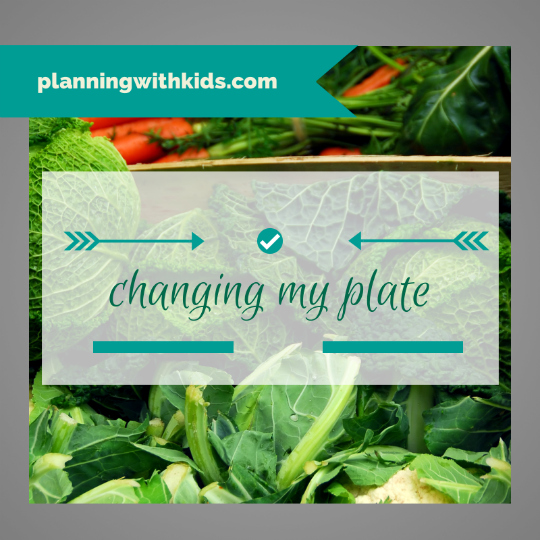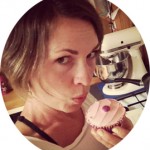 This post is part of a regular series focusing on making small changes to improve our health. I shared my journey with changing my diet and moving to a clean eating approach which you can read here. I also had the lovely Katie Rainbird from Katie 180 undertake an analysis of my food intake for one day in that post, which was another step in the right direction.
This post is part of a regular series focusing on making small changes to improve our health. I shared my journey with changing my diet and moving to a clean eating approach which you can read here. I also had the lovely Katie Rainbird from Katie 180 undertake an analysis of my food intake for one day in that post, which was another step in the right direction.
Together we also offered the same opportunity to readers of Planning With Kids. We were blown away with the response and while I can’t guarantee will get to all of them this year, Katie has been busy working on many of the submissions already and we will publish as many as we can.
It is not possible for Katie to cover off everything in these posts. The aim is for her to find some small things you can change to what you are putting on your plate to help you achieve your current goal for your eating habits. You can read previous Changing my plate posts by clicking here.
Changing my plate – Andrea’s day
 Katie Rainbird (AKA Katie180) is a Sydney-based Nutritionist who is just as likely to be found jogging as she is baking. She is a mother to two, a keen home cook, prefers to get around in her workout gear and has a major passion for the written word. You can learn more at www.katie180.com.au.
Katie Rainbird (AKA Katie180) is a Sydney-based Nutritionist who is just as likely to be found jogging as she is baking. She is a mother to two, a keen home cook, prefers to get around in her workout gear and has a major passion for the written word. You can learn more at www.katie180.com.au.
Katie reviewed what a reader Andrea submitted that she ate in a 24 hour period. This is what Katie had to say about her day:
What is your current goal with your eating habits?
Trying to reduce sugar rush! / cake addiction.
Breakfast
Driving – doing school run and then on to work ate mixture of fruit chopped up, oranges, mangoes, grapes, melon, strawberries etc.
Cup of tea on waking and when arrive in office, then cup of coffee mid morning.
Add some protein to your breakfast: a serve of whole fat yoghurt and a 1/4 cup mixed seeds (pumpkin, sunflower, linseed, chia) you can put this all into a container and still eat it in the car.
Lunch
Usually a piece of cake, croissant or other sweet pastry together with a cup of tea or decaf coffee. Will then drink only water from lunch time as this affects my sleep if I take caffeine past lunchtime.
Try switching from decaf coffee to green tea, as you like sweets you might enjoy the blend with jasmine. Green tea, although caffeinated, affects the central nervous system differently to coffee. It stimulates in a gentler fashion, I have written on it here Top 5 With Green Tea. Also to start the reduction of cake intake I’d suggest every second day opting against a pastry or cake and rather having some wholegrain crackers with cream cheese / cottage cheese / butter / peanut butter – something that feels decadent but isn’t CAKE, you know?
Dinner
Dinner is usually between 5 to 5.30 pm usually eat with small child (age 5) and husband if he is at home. Usually, carbs (potatoes or pasta), meat and lots of veg/salad. Occasionally we have a pudding after dinner but not always.
Try introducing other grains even if only for yourself, you can cook in batches and keep in the fridge/freezer to re-heat and add alongside the dinner you make for the family. Quinoa, rice, pearl barley, lentils, even a tin of four bean mix… get mixed plant protein in and as such, reduce the monopoly intake of wheat and spuds. NOT that these are “bad” foods, I don’t see it this way, but variety is great for the digestive system and I think you need to fill up on more whole grain sources.
Snack 1
Maybe a biscuit or yoghurt mid morning.
Again, try day on, day off for the biscuit and start introducing snack items such as: pop corn which you can make in batches on coconut oil NOT vegetable oil, raw nuts, seeds and a couple of squares of dark chocolate, try Nic’s Lara bar inspired snacks, make a muesli cookie with lots of nut butter, nuts, seeds and use honey instead of sugar. Fresh cut vegetable sticks, sugar snap peas, cubes of feta and a few rice crackers are a sweet alternative too.
Snack 2
Additional piece of cake mid afternoon or an apple on the way to school pick up.
If you’ve had cake in the morning, leave it in the afternoon and vice versa. Make some wholemeal or sourdough toast and spread it with a vanilla bean ricotta, peanut butter, ABC spread and a drizzle of honey rather.
Snack 3
N/A
Dessert
Sticky toffee pudding and custard! very occasionally. I usually get my pudding fix at mid-day. May also occasionally have a biscuit but rarely.
Nutritional supplements
2 x tsp of virgin coconut oil daily.
1 vitamin c and zinc supplement tablet.
Increase your vitamin C: if it’s a 500mg tablet, have 4 across the day, if it’s a 1000mg tablet, have 2 across the day. Vitamin C competes with glucose for uptake into cells and as such, sugar cravings can displace vitamin C inside cells. It’s also just a great anti-oxidant, assisting the liver in its role of detoxification, the adrenal glands in their synthesis of hormones and the immune system fight baddies.
Daily fluid intake
usually 2 cups of tea and 1 cup of coffee and maybe 1 cup of decaf coffee.
1 litre of water.
Try to increase water at least by another 500mL especially when you think you want cake: have a glass of water first. Thirst and hunger often feel the same. And as suggested, introduce some green tea to replace the decaf. Also try other herbal teas to drink in the afternoon when you’d like a cuppa but can’t drink caffeinated varieties.
Any further information you’d like to share or special dietary requirements to factor in?
I crave cakes but enjoy baking and cooking (helps me de-stress) – I feel I need to have a cake/pastry each day otherwise I will not be able to survive!!
Katie’s summary
I love cake too! So I hear you on this. But I am thoughtful about how I eat it and when I assess my intake of food for the day, if it’s wheat flour heavy I simply rule it out. It’s about being aware and wilful. You can have your cake and eat it too… but you need to include more whole foods around it!
Further reading
Disclaimer
Katie is a qualified nutritionist (Adv. Dip. Nutr. Med.).
Any diet or lifestyle changes that you implement as a result of reading this blog are your own responsibility.
This blog does not provide medical advice, any particular health conditions must be managed by your own health professional.
The content of this blog is not intended to be a substitute for professional medical advice, diagnosis or treatment.
Always seek the advice of your physician or other qualified health provider with any questions you may have regarding a medical condition. Never disregard professional medical advice or delay in seeking it because of something you have read on this blog.
